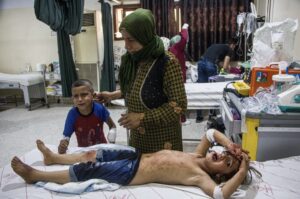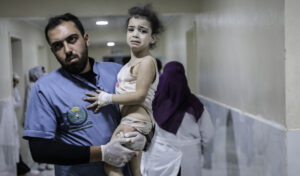In the midst of the Syrian war, where displacement and economic instability have become unfortunate norms, the transformation of plastic waste into rugs has emerged as a vital lifeline for many residents in Idlib province.
Hard Labor and Livelihood:
At a rubbish dump in northwest Syria, children like Behlal, alongside their parents, engage in the laborious task of sifting through the refuse, earning meager wages of $7 to $10 per week. Displaced from Aleppo province during the war, Behlal and his family endure difficult conditions to make ends meet. Their resilience and determination to provide for themselves highlight the harsh realities they face and the urgent need for employment opportunities.
Recycling as a Viable Solution:
Recycling plastic waste has emerged as a viable solution for residents of Idlib, both in terms of generating income and obtaining affordable goods. Workers, including children, sort plastic junk by color, cut it up, and crush it into small pieces. These fragments are then washed and melted into plastic pellets. The recycling process not only reduces the environmental impact of plastic waste but also creates raw materials for further production.
The Hazards of the Trade:
While recycling provides a lifeline for these communities, it is not without risks. Farhan Sleiman, a worker at the scrapyard, expresses concerns about contracting diseases due to working with the rubbish. Children, too, are exposed to these risks, raising concerns about their health and well-being. The precarious working conditions emphasize the urgent need for proper safety measures and support systems to protect the vulnerable individuals engaged in this industry.
Empowerment through Employment:
In northern Idlib province, a factory transforms the plastic pellets into vibrant mats and rugs. Khaled Rashu, the factory owner, highlights the significance of his enterprise by providing employment to more than 30 individuals in an area plagued by unemployment. The presence of job opportunities is crucial for sustaining livelihoods and restoring a sense of stability in the region. The involvement of children in this factory, albeit challenging, contributes to their empowerment by offering economic opportunities for themselves and their families.
Addressing Basic Needs:
The mats and rugs produced by the factory find eager customers among the displaced population living in basic tents or makeshift dwellings. These affordable alternatives provide much-needed comfort and insulation during the harsh Syrian winters. Moreover, the bright colors and attractive designs offer a sense of aesthetic pleasure and emotional upliftment in challenging circumstances. The availability of reasonably priced plastic mats also ensures accessibility for those with limited financial resources.
The children engaged in transforming plastic waste into rugs in Syria demonstrate remarkable resilience and adaptability in the face of adversity. While their involvement in this labor-intensive industry highlights the pressing need for improved safety measures and better working conditions, it also presents an opportunity for empowerment and economic stability. Through recycling, these children contribute to the creation of livelihoods and affordable goods, providing a glimmer of hope in a war-torn region. Efforts should be made to ensure their well-being, education, and protection, while simultaneously supporting initiatives that foster sustainable development and enhance their prospects for a better future.















